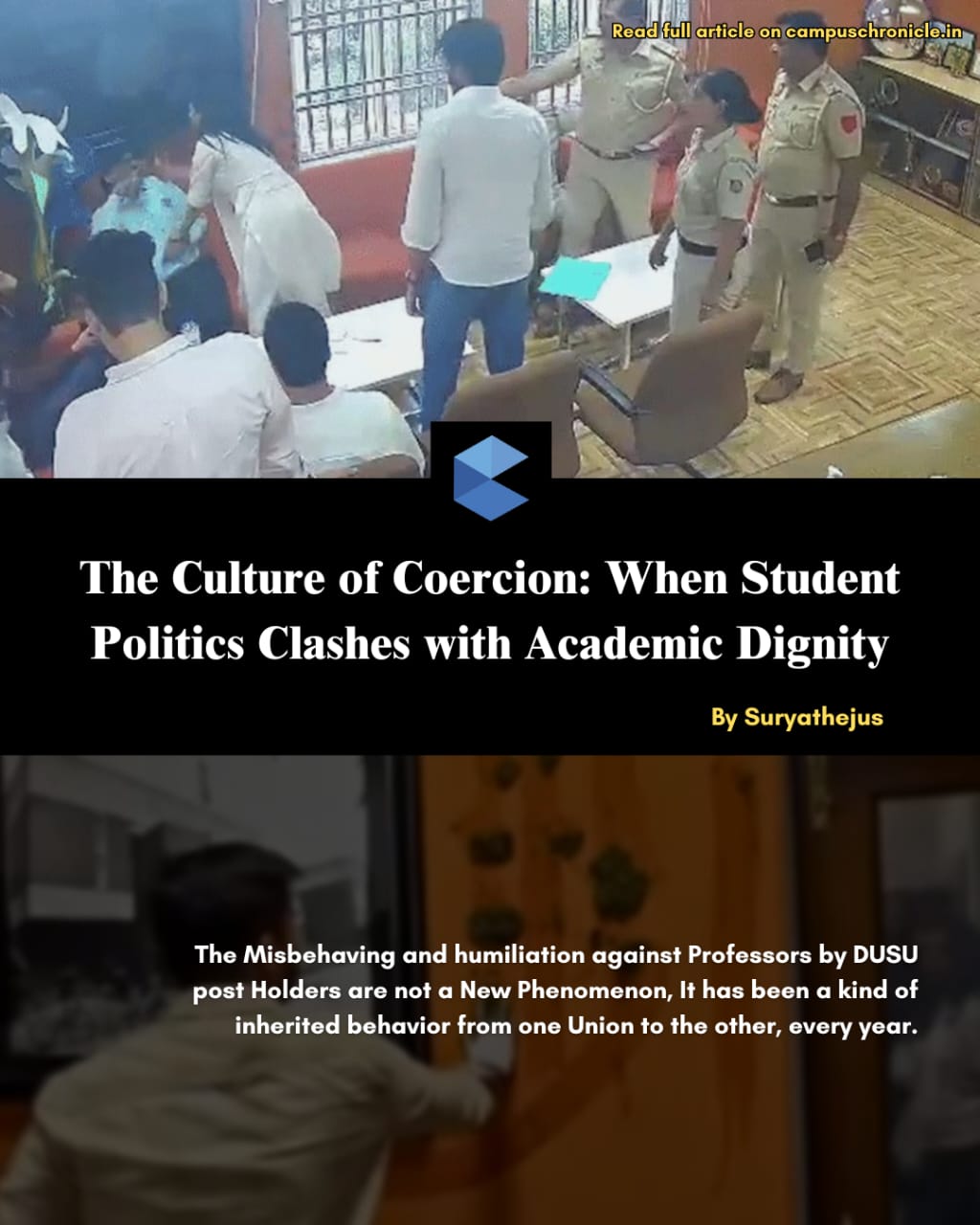Suryathejus
The Misbehaving and humiliation against Professors by DUSU post Holders are not a New Phenomenon, It has been a kind of inherited behavior from one Union to the other, every year. This time it’s Deepika Jha the Joint Secretary of the Delhi University Students’ Union (DUSU), affiliated to the Akhil Bharatiya Vidyarthi Parishad (ABVP), who has been reported slapping a professor from Dr. Bhim Rao Ambedkar College. This shocking incident, captured on video and occurring in the Principal’s office in the presence of police, brings the toxic culture of “mobocracy” in student politics into sharp focus, threatening the fundamental sanctity of the student-teacher relationship in India’s premier university.
Background: The Seeds of Conflict
The roots of the confrontation lie in ongoing campus disciplinary matters and political friction between student groups. The assaulted faculty member, Professor Sujit Kumar, served as the Convenor of the college’s Disciplinary Committee.
According to the teacher’s account, the immediate trigger was a disciplinary process concerning a recent instance of campus violence. This involved a scuffle during the student council’s oath-taking ceremony, where an elected student was allegedly thrashed by members of the ABVP. Professor Kumar’s committee was investigating this, and possibly other past incidents of indiscipline involving ABVP-affiliated students. Professor Kumar claims that his impartial action to maintain order and discipline provoked the aggressive response.
The Situation That Led to the Slapping
The incident reached its peak when DUSU office-bearers, including Deepika Jha, allegedly arrived at the college with a group of around 50 students, demanding Professor Kumar’s resignation from the disciplinary post.
Professor’s Account:
Professor Kumar stated that he was coerced and physically assaulted. He claims he was forced to resign from his position in the Principal’s office. Despite the presence of police, the argument escalated, culminating in the Joint Secretary physically striking him.
DUSU Post Holder’s Counter-Claim:
The DUSU Joint Secretary, Deepika Jha, presented a starkly different version. She claimed she was at the college to address students’ complaints of “misbehavior and physical assault” by Professor Kumar, which they claimed was politically motivated. She alleged that in the Principal’s room, the professor threatened her, used abusive language, made “indecent remarks,” and was potentially under the “influence of alcohol.” She described the slapping as an impulsive reaction in a moment of distress and anger.
Irrespective of the immediate provocation—which the university is now investigating—the fact remains that an elected student leader physically attacked a senior professor inside an administrative office, surrounded by police.
The Message to Common Students: A License for Lawlessness
Such an egregious display of violence by elected post-holders sends a devastating message to the wider student body and the academic community.
1. Erosion of Authority
It signals that elected student positions are tools of power that supersede academic and administrative authority. When a disciplinary head can be physically attacked for doing his job, it creates an atmosphere of fear and forces other teachers to retreat from enforcing rules.
2. The Power of Hooliganism
This incident validates the idea that “mobocracy” and physical intimidation, rather than dialogue and adherence to rules, are the most effective means to settle disputes and avoid disciplinary action. For common students seeking genuine redressal, this replaces the democratic process with violence.
The Betrayal of Bharatiya Culture and the Guru–Shishya Parampara
In Indian culture, the teacher-student bond is sacred, rooted in the age-old Guru–Shishya Parampara. This tradition, which has shaped Indian philosophy and education for millennia, views the Guru as a spiritual guide who leads the student from ignorance to enlightenment.
The Shishya (disciple) is expected to approach the Guru with humility, dedication, and respect. The physical assault on a teacher—the very symbol of knowledge—is therefore not just a breach of university rules but a profound betrayal of the ethical and moral values that form the bedrock of Indian society.
The Apology and the Way Forward
In a later statement, DUSU Joint Secretary Deepika Jha acknowledged the wrongfulness of her action. While maintaining her allegations against the professor’s conduct, she stated:
“In that moment of distress and anger, I reacted impulsively, for which I sincerely express regret. I apologise to the entire teaching community for this incident.”
While the apology is noted, the damage has been done, and only firm, decisive institutional action can restore the dignity of the academic space and reaffirm the enduring value of the Guru–Shishya relationship.





